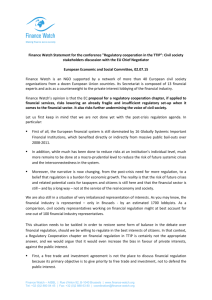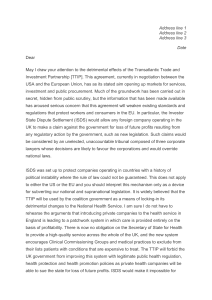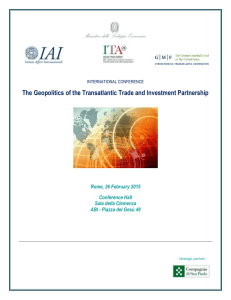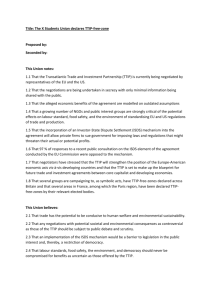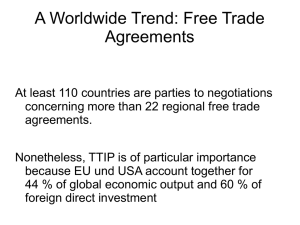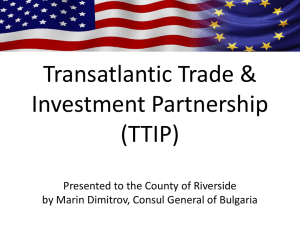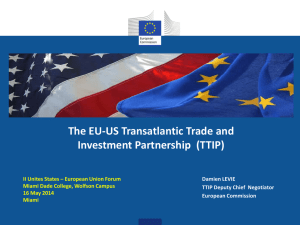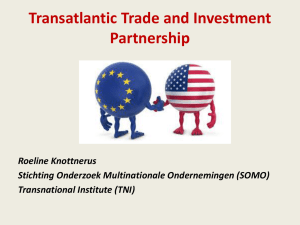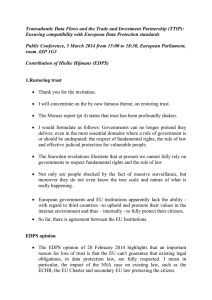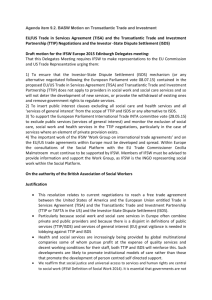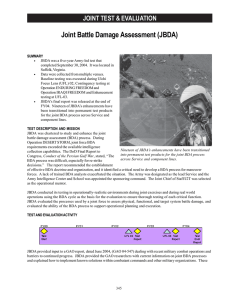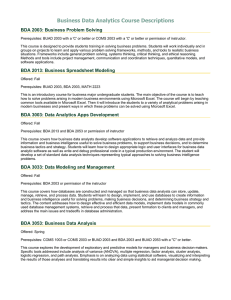Summary
advertisement
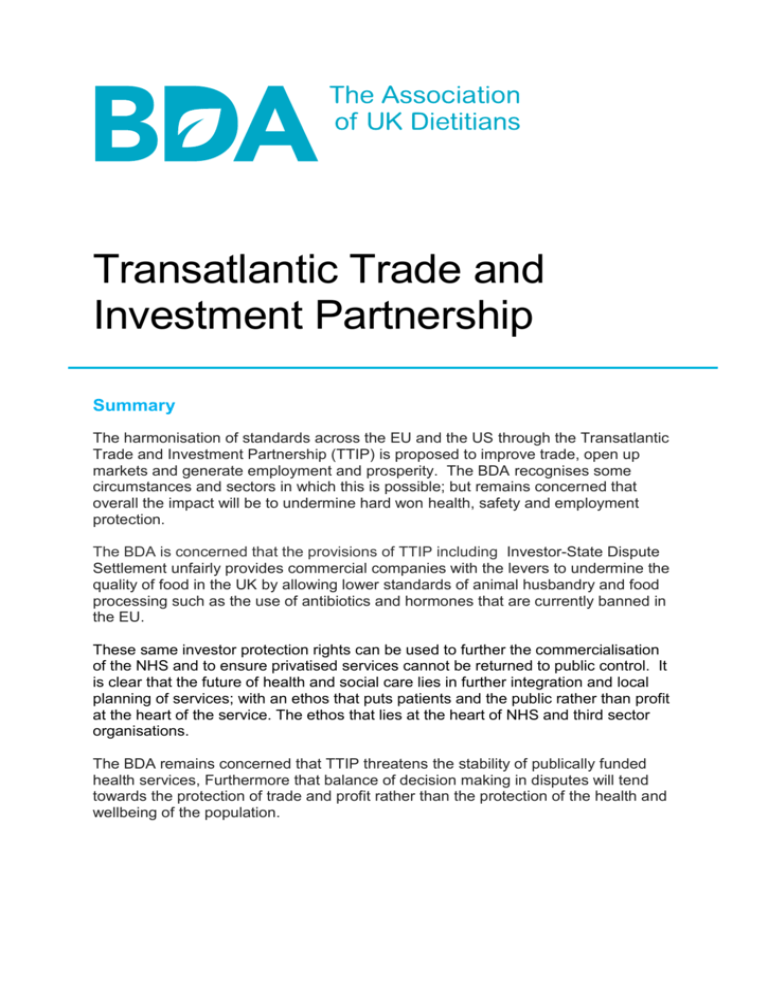
Transatlantic Trade and Investment Partnership Summary The harmonisation of standards across the EU and the US through the Transatlantic Trade and Investment Partnership (TTIP) is proposed to improve trade, open up markets and generate employment and prosperity. The BDA recognises some circumstances and sectors in which this is possible; but remains concerned that overall the impact will be to undermine hard won health, safety and employment protection. The BDA is concerned that the provisions of TTIP including Investor-State Dispute Settlement unfairly provides commercial companies with the levers to undermine the quality of food in the UK by allowing lower standards of animal husbandry and food processing such as the use of antibiotics and hormones that are currently banned in the EU. These same investor protection rights can be used to further the commercialisation of the NHS and to ensure privatised services cannot be returned to public control. It is clear that the future of health and social care lies in further integration and local planning of services; with an ethos that puts patients and the public rather than profit at the heart of the service. The ethos that lies at the heart of NHS and third sector organisations. The BDA remains concerned that TTIP threatens the stability of publically funded health services, Furthermore that balance of decision making in disputes will tend towards the protection of trade and profit rather than the protection of the health and wellbeing of the population. Recommendations The BDA calls for the following protections to be included 1. The BDA is committed to a publically funded NHS, free at the point of care and provided by organisations whose primary purpose is not profit. We call for the provision of all tax or social insurance funded health services to be excluded from the TTIP process. 2. The BDA believes that government action is often required to protect public health. This action may lead to reduction in profits for commercial companies. Therefore, we call for the specific exclusion of actions taken to protect public health from ISDS 3. Health and safety and employment regulations are important in ensuring adequate standard of living and safety from avoidable accidents at work. We ask that the EU protects the standard of living and employment rights during the TTIP process. 4. The current high standards of public protection and information through food standards must be protected including but not restricted to food labelling, food additives, hormones and antibiotics used in animal husbandry. 5. The balance of decision making on individual clauses should always tend towards highest standards, the protection of public health and employment rights. Discussion TTIP is a proposed agreement between the EU and US which has the potential to be the biggest trade deal ever concluded. The negotiations (which have been ongoing for years) will remove tariffs and regulatory barriers and standardise rules so that companies can access each other’s market more easily. TTIP has the potential to benefit many industries in both the EU and US – including pharmaceutical, energy, clothing and textiles, and food and drink. For example, the UK could export for the first time, British venison and lamb, which is banned in the US - and it will remove tariffs on exports, such as clothing produced in the EU To make this happen standards between the US and EU need to be harmonised, and these could include labour standards, environmental protections and standards for goods and services; including standards for food safety, production and labelling. Many items are still under negotiation such as geographical protection of food products including Parma Ham, Champagne and Cornish Pasties and there are concerns that practices that are allowed in the US but banned in the EU would have to be allowed. These include antibiotics and hormones in animal husbandry, the use of chlorine in poultry processing or genetically modified foods and seeds. Investor State Dispute Settlement (ISDS) clauses protect investors from the actions of government that damage their investments such as discriminations against foreign investors. However, ISDS could allow companies to sue government if public policy leads to a reduction in profits. An example is Philip Morris suing the Australian Government after they introduced plain packaging for cigarettes. In the UK there are also worries about TTIP facilitating US companies accessing public services most especially the NHS. Not everyone sees this as a problem but recently the Public Health committee of the European Union has called for the explicit exclusion of health from the TTIP negotiations. There is some expectation that this vote will put pressure on the economic committee to follow suit The Government rebuts all these concerns in its response to the House of Lords report on TTIP, but concerns remain. Further Information https://www.gov.uk/government/uploads/system/uploads/attachment_data/file/329716/42014 -Cm-8907-Transatlantic-trade-and-investment-partnership.pdf http://www.theguardian.com/business/ttip http://www.nhsconfed.org/regions-and-eu/nhs-european-office/influencing-eupolicy/transatlantic-trade-and-investment-partnership http://www.ag.gov.au/tobaccoplainpackaging Published May 2015 Review May 2017 ©2015 The British Dietetic Association 5th Floor, Charles House, 148/9 Great Charles Street Queensway, Birmingham B3 3HT Tel: 0121 200 8080 Fax: 0121 200 8081 email: info@bda.uk.com Commercial copying, hiring or lending without the written permission of the BDA is prohibited. bda.uk.com
